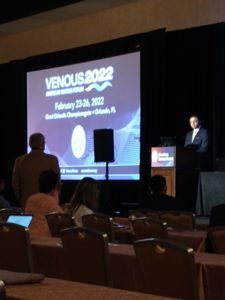
Envveno Medical announced positive 30-month data from the first-in-human trial of the VenoValve bioprosthetic potential venous valve replacement during the 2022 American Venous Forum (AVF) annual meeting (VENOUS2022) held in Orlando, Florida (Feb. 23–26).
The results showed that VenoValve recipients—now an average of 30 months post-VenoValve implantation—continue to benefit from the device and have experienced no relapses of severe chronic venous insufficiency (CVI), no recurrences of venous ulcers, and no material adverse safety events, the company reported. Average improvement in reflux was 55%, average improvement in venous clinical severity score (VCSS) was 61%, and average improvement in visual analog scale (VAS) was 81%, all compared to pre-VenoValve levels for the eight first-in-human patients who agreed to be followed, including one patient now three years post implantation.
The data were presented by Sebastian Cifuentes, MD, until recently a vascular surgery research fellow at Fundacion Santa Fe-Universidad de los Andes, Bogota, Colombia, and part of a research team led by principal investigator Jorge Ulloa, MD, of the same institution.
Cifuentes told AVF 2022 delegates that patients implanted with the VenoValve showed improvement was “maintained” out to 2.5 years without the occurrence of adverse events, with no recurrence in C5 patients and no new ulcers on the ipsilateral side in C6 patients based on the CEAP (Clinical-Etiological-Anatomical-Pathophysiological) classification of disease severity.
The VenoValve is currently being evaluated in the SAVVE (surgical anti-reflux venous valve endoprosthesis) U.S. pivotal trial, with a primary safety endpoint of absence of material adverse safety events in 26% or less of the patients at one month post-implantation, and a primary effectiveness endpoint of improvement in reflux of at least 30% measured at six months.












